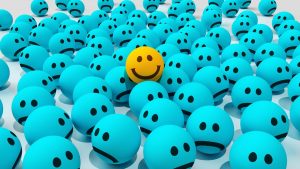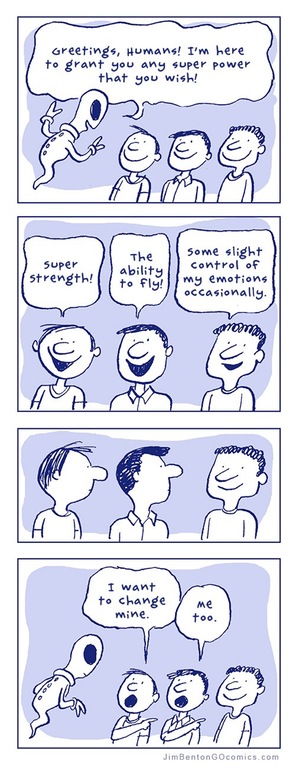Leashing Your Emotions
The world is a tragedy to those who feel, but a comedy to those who think. — Horace Walpole
What if with today’s post, I could teach you one of the most powerful psychological superpowers you could dream of? Probably a pretty tall order for an early morning post from a free blog you only sometimes click the link to.
Although I’ve posted the comic to the right before (offering similar advice on this most desirable of psychological effects), it’s so true:
If we were able to have full—heck, even some control over our emotions, we could be in any situation in the world with a smile on our face. I mean, why do you think drugs are so popular?
But today, rather than talk about the use of external agents to regulate your emotions, let’s discuss how it all begins with a simple belief.
LAY THEORIES
Previously, I’ve talked about lay theories (also known as implicit beliefs or naïve theories) on this site. To quote the grandmother of this research, lay theories are “core assumptions in an individual’s worldview that defines the individual’s reality and imparts meaning to events” (Dweck, Chiu, & Hong, 1995; p. 268).

Now, one thing to note about these lay theories is that they’re not just about you. Although it may seem like a minor difference between believing whether your own intelligence is fixed or changeable versus most people’s intelligence is fixed or changeable, it can make a big difference. (And for a discussion of these differences, see today’s Psych•o•philosophy to Ponder section.)
What’s really important to know about these lay theories, however, is that we don’t just hold them for things like people’s intelligence or even personality. But also, we hold them in regard to the controllability of emotions.
WITHIN YOUR POWER OR NOT?
In three separate studies, researchers measured people’s lay theories surrounding the controllability of emotion. Want to see where you stand? Write down your answers to the following question on a 1 – 7 scale, where 1 = strongly disagree and 7 = strongly agree:
-
- No matter how hard they try, people cannot really change the emotions that they have
- Everyone can learn to control their emotions
- The truth is, people have very little control over their emotions
- If they want to, people can change the emotions that they have

For reference, a sample of adults, on average, scored 4.59. That means if you scored a 5.91 or higher, you believe emotions are pretty controllable relative to other people; however, if you scored a 3.27 or below, that means you tend to think emotions are not very controllable.
And what these researchers found is that the less controllable people believed emotions were, the more negative psychological outcomes they exhibited. That is, the more people endorsed a fixed mindset about emotions, the more depressive symptoms and worse psychological health they exhibited.
CASCADING EFFECTS

I mean, if you don’t believe emotions are controllable, why even try to take steps to change them?
Thus, people’s emotions became unchangeable by the simple fact people believed they were unchangeable.
The researchers also found (sadly) that these beliefs about emotions start when we’re young. In fact, research shows that children as young as five years old have already developed beliefs about how to regulate their emotions.
So, do your best to spread the word that emotions are controllable—so long as you believe they are! And I wouldn’t mind the reminder myself considering the seemingly uncontrollable anxiety I feel in light of job applications! ????
Semi-Controllably,
jdt
Everyday Psychology: Today, we focused on how one’s belief in the changeability of emotions can affect their own emotional experiences. But how else might these beliefs impact how we interact with others? If you don’t believe emotions are controllable, how will that influence the steps you take to console someone? Or if you believe someone’s anger is unchangeable, will you just let them “vent it out?” Possibly even more interesting is the impact these beliefs can have on stereotypes. For example, there is the stereotype that women are more emotional than men (note: acknowledging a stereotype is different than endorsing a stereotype). In the research I cited today, they found that young girls tended to believe emotions were more uncontrollable than young boys did. How may people’s stereotypes about women have influenced this? Fortunately, this difference in the controllability of emotions disappears in older age; however, gender differences in the belief at a young age—when we’re so impressionable—can have some long-term, negative consequences.
Ford, B. Q., Lwi, S. J., Gentzler, A. L., Hankin, B., & Mauss, I. B. (2018). The cost of believing emotions are uncontrollable: Youths’ beliefs about emotion predict emotion regulation and depressive symptoms. Journal of Experimental Psychology: General, 147(8), 1170.









Jake – excellent post.
“Reason” should be the decision maker. “Emotion” should be the cheer leader to “Reason”
To have emotions is to be human, but controlling them in many incidences would have benefitted humanity.
Ooh! I like that idea of emotion being the “cheerleader” for reason. I couldn’t agree more that many negative outcomes in history have come at the expense of favoring emotion over reason. At the same time, there have also been some heinous acts at the expense of favoring “cold rationality” over compassion. So, although I’m on board that we should rely on reason for our decisions, I do think there should be times where what is “reasonable” is also what’s compassionate/ emotion-driven.
So I feel like taking the bold step of making a double post today. Sometimes I hear phrases like “controlling your anger” or “be patient”, but I have felt that the language we have around emotions is incorrect when using phrases like that. Saying ‘be patient’ when patience usually isn’t the right emotion or behavior, it’s really understanding that what you are waiting for (whatever it is) takes time and is outside your control, and focusing or wanting on things outside your control and trying to influence things you can’t influence are setting you up for failure long term. But people say ‘be patient’. Patience is for when something is within your control but you want something more long term; when outside your control, it’s about understanding your situation and how your emotions are incorrectly applied.
Same with anger. I hear it in golf, sports, etc. But why get angry when you miss a 3? it’s not in your control to make a three; its in your control to square up, to jump vertically, to have a good release, good arc on the ball, but no one can control if it goes in, only put yourself in a good position for a good outcome.
My two cents. Great post!
Haha Well I’m glad you took the bold step of a second post! I loved the ideas and thoughts you had to share — per usual 😉 I agree that there is a lot of bad advice out there about how to take control of/guide our emotions; and your example of “be patient” is spot on. Not only does it seem like an ineffective suggestion, but it also seems to undermine the validity of that emotion itself. It reminds me of some work that when you tell anxious people “just be calm,” it really has no effect. However, if you tell them, “reframe your anxiety as excitement,” it actually can serve to calm them.
In a way, this connects to what you said at the end about how you can only put yourself in a good position for a good outcome; and the outcome itself will do its own thing. That is, you’re going to get angry/anxious/etc. just as physical outcomes are going to happen beyond your control. However, we do have some say over how we *respond* to those emotions/outcomes, and there are better and worse ways to impose that influence. Naturally, this reminds me of stoicism and some of the famous quotes they have there. Thank you for the great comment!
This is an interesting topic, being able to change and direct one’s emotions is really valuable in life. Great post bro!